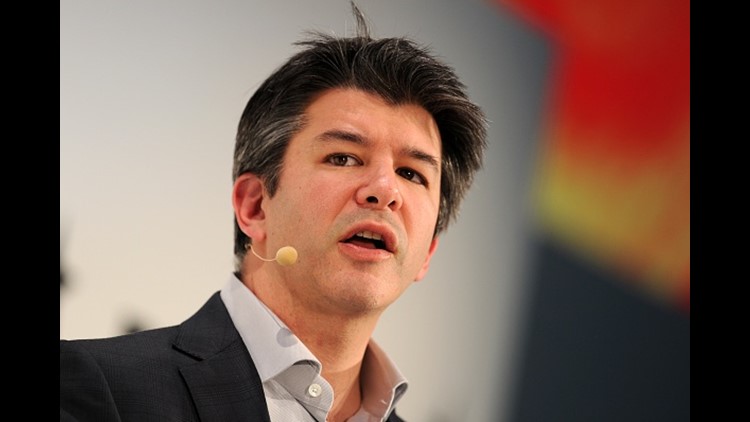Uber CEO Travis Kalanick announced Tuesday that he will take a leave of absence just as the recommendations of a four-month internal investigation into Uber's culture and governance by former U.S. Attorney General Eric Holder lands.
Kalanick has been largely absent from the company's San Francisco headquarters since late May, when his mother was killed in a boating accident and his father was seriously injured.
"For the last eight years my life has always been about Uber," Kalanick said in a statment. "Recent events have brought home for me that people are more important than work, and that I need to take some time off of the day-to-day to grieve my mother, whom I buried on Friday, to reflect, to work on myself, and to focus on building out a world-class leadership team."
The Holder report was presented to Uber's board of directors a week ago but were released to employees Tuesday. Kalanick and cofounder Garrett Camp control voting rights on the privately company.
The nearly 50 recommendations targeted everything from Kalanick's role and control to ways for senior leadership to hold managers accountable for a cultural turnaround. The recommendations include forming a board oversight committee, rewriting Uber’s cultural values, mandating leadership training and making inclusion and diversity a high priority.
Former political operative Bernard Coleman III, who was hired as Uber's new head of diversity and inclusion, should expect to see his mandate grow.
Uber's new head of human resources Liane Hornsey said in a statement that "implementing (the report) recommendations will improve our culture, promote fairness and accountability, and establish processes and systems to ensure the mistakes of the past will not be repeated. While change does not happen overnight, we’re committed to rebuilding trust with our employees, riders and drivers."
Uber investors Mitch Kapor and Freada Kapor Klein, who actively push for diversity in tech and were very critical of Uber and its CEO during the crisis, said in a statement Tuesday that "the recommendations are both thoughtful and extensive, and we are very encouraged that they have taken this as seriously as we had hoped."
But the couple blasted Uber for exemplifying a habit of allowing "senior, visible people in the larger tech ecosystem (to) excuse the reprehensible behavior of some individuals, and we have observed the pattern of passing around bad actors from company to company."
The first line of the report, compiled by Holder's firm Covington & Burling, cites former engineer Susan Fowler's explosive February blog post as the catalyst for the introspective turn at Uber. While Silicon Valley has been known for decades as a boys club, with women often experiencing discrimination, this is the first time a public post has managed to shake a major tech player to its core.
Among the recommendations: Use performance reviews to hold senior leaders accountable for responding to employee complaints and increasing diversity at the company; enhance the independence of the board by adding more independent board sets and having an independent board chair; nominate a senior executive to ensure that the recommendations are implemented.
On Monday, Nestle executive Wan Ling Martello was appointed a new independent board member.
The report also urged a crackdown on Uber's lax internal controls, suggesting changes that could make the company come more in line with the structure of a large public company. These include expanding the size, role, and independence of the audit committee, tighten rules regarding travel and expense reimbursement, and installing compliant software to track all HR complaints and disciplinary actions.
Uber's famously aggressive 14 company values, based on a set of Amazon values, also came under fire. Goals such as "Always be hustlin'" and "Toe Stepping" should be cast aside, and a new, shorter set of values established with the help of an outside agency.
More than anything, the recommendations paint Uber as a successful but unruly child of a company, one in need of adult supervision.
The much anticipated recommendations come on the heels of Monday's high-profile resignation of senior vice president Emil Michael, a man at the center of many Uber controversies, and last week's firing of 20 employees.
More dismissals are expected from the separate investigation by law firm Perkins Coie into 215 instances of sexual discrimination, bullying and other forms of workplace abuse flagged by Uber employees.
Uber's story is the stuff of Silicon Valley legend, rising fast in eight years from bootstrapped local favorite to global phenomenon valued at close to $70 billion. But in recent months, Uber has looked like high-flying Icarus. The company has been hammered for fostering a sexist and cutthroat office culture and encouraging a business culture that didn't shrink from shady tactics.
But can any pointed recommendations or immediate employee departures truly fix Uber?
Industry experts say that the mere appearance of change, from vowing to send inexperienced managers to coaching sessions to bringing on a few high-ranking female executives in recent days, won't be nearly enough to convince employees that the culture is going to radically shift.
"It's important to remember that Uber's problems are diverse, including the mistreatment of employees, secret programs used to get around regulators and a less than stellar relationship with its drivers," says Jeremy Robinson-Leon, principal at corporate communications firm Gordon Group. "It won't be enough to address one, and each will require different fixes."
One way to do that is to "embed quality metrics into everything you do," says Micah Alpern, cultural transformation expert with A.T. Kearny. "You create change by holding everyone accountable for being a part of the change. If 20% of your staff don't pass muster, you set the targets and give them a chance. And if they keep bringing down the culture, they have to go."
If culture starts at the top, it stands to reason that Kalanick stepping aside, even temporarily, might help fix a variety of company woes.
After all, the CEO has long been the poster child for Uber's successes and failures. He's been integral to the company's sharp-elbowed approach to bulldozing past taxi unions and city officials. And he's been a key part of creating the company's frat-like culture, from calling Uber "Boob-er" after how it helped him with dating to reportedly writing party memos warning employees to make sure any sex was consensual.
Robinson-Leon says that if a company's problems "are driven from the top, putting a CEO in a different position or simply leaving is key, or big change won't be successful."
Alpern does envision a way for Kalanick to still guide Uber, but it would require the CEO to lead by example in a genuine way that makes employees believe the shift is for real. "If he remains (at Uber), people will believe it if they see him go out and model the new way, talking to people. That goes a long way."
But those looking for signs that Uber may not be willing to do the grueling work to recast itself don't need to hunt long for examples.
Last week, the company's former head of Asia Pacific operations was fired for his role in securing an Indian rape victim's medical records, but only after the incident was raised by media outlet Recode, which also reported on the party memo.
While the company has recently hired two high profile women, Harvard cultural change expert Frances Frei and Apple branding expert Bozoma Saint James, its leadership ranks already have two other executives that have been unabashed supporters of Kalanick.
Board member Arianna Huffington has repeatedly sung Kalanick's praises and dismissed the notion of him being asked to step down. Newly minted human resources chief Liane Hornsey told USA TODAY she suffers "cognitive dissonance every day" when she compares the Kalanick she knows with his portrayal as a highly aggressive CEO.
Uber also has failed to act decisively on a number of personnel matters, suggesting that speed may not be of the essence in any upcoming changes. The company is still on the hunt for a chief operating officer, someone that Kalanick has said he is eager to have share leadership responsibilities.
There also is no replacement yet for vice president of engineering Amit Singhal, who resigned in February after failing to disclose a sexual harassment complaint against him during his time at Google, according to Recode. And there's no replacement for its former vice president of mapping, Brian McClendon, who left the company in March.



